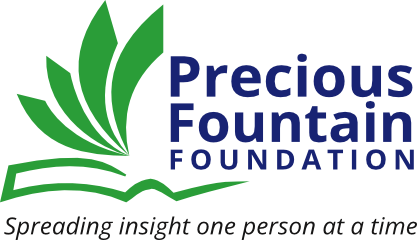- info@preciousfountain.org
- +234 806 870 0572

I was 4 years old when I first spoke Igbo publicly on a plane coming from London to Nigeria. The surprised looks on people’s faces when I start speaking Igbo is one that always brings a smile to my face, people being shocked that I’ve moved from Nigeria to the UK and have been able to learn English and also maintain my understanding and speaking of the Igbo language.
Igbo or Ásụ̀sụ̀ Ìgbò is the principal native language of the Igbo people. It is recognized as one of the three major languages in Nigeria. Igbo has over 20 dialects which is not only centred in Nigeria but with Igbo speaking communities in countries such as Brazil, Jamaica, Bahamas and Trinidad and Tobago just to name a few.
Language is said to be a means of communication between individuals who share a common code, this being in the form of symbols; in the case of spoken Igbo, it is an oral code. The most essential asset is the mother tongue it is as Onuigbo puts it ” a unique human gift from God to man” and therefore a fundamental identification key in environments in which apply pressure to forget who you are and conform to their language standards. This exact fact brings back memories of school in which teachers encouraged my mum to only speak English to me because they were “scared” that I would confuse the two and subsequently be under-developed in my English-speaking skills.
I feel that if I had ended up not being able to understand Igbo at least, right now as an Igbo living in Diaspora I would feel left out as I believe that the Igbo language is a unifying factor and an efficient tool for the passing down Igbo culture from generation to generation as quoted from Omego. An example can be a marriage ceremony or even a party with some parts traditionally being spoken in Igbo e.g., breaking of the kola nut generational traditions that can die out because of a language barrier. Igbo language and Igbo culture are juxtaposed and the basic characteristics of language are what reflects the culture of its speakers by transmitting one’s cultural heritage (breaking of the kola nut).
Language death is something that I have always been scared about and the realisation becomes more prominent as I come to realise parents and grandparents (who are fluent in the Igbo language and try to pass down the language) are not going to be here forever. Language death is where a language may cease to be used in our community as we, the next generation, are unable to speak it. The most common process leading to language death is one in which a community of speakers of one language becomes bilingual in another language and gradually shifts to only speaking one language. Concerning the generation, I am in, it is already prominent as most of my agemates have grown up in the UK and therefore have classified English as their first language and are making no effort to try and learn their original language. There have been so many times I have wanted to say something in Igbo e.g., a funny joke or just to genuinely speak in my mother tongue but because they can’t reply in Igbo, I feel awkward. Without a language, there is no heart-to-heart connection between species of any kind and I feel that this is true within the generation I live in; the connection that young Igbos should have through language will be lost, and this will be passed down through generations to come until we are mere strangers that only identify each other through the colour of our skin and being Igbo “by mouth”.
In addition to this UNESCO (United Nations Educational, Scientific and Cultural Organisation) has predicted a possible extinction of the Igbo language in the next 50 years which is being widely accepted by Igbos that are living both at home and abroad.
An Igbo woman living in America said “Yes, I agree. A lot of our families do speak English to our kids including myself. Charity begins at home. Especially we that live in the western world have adhered to the society we are in and speak English to our kids. Look at the Yoruba people in America, they speak Yoruba to their kids and teach them their culture. I have just started speaking Igbo to my kids. God help us.” This can be seen as proof that Igbos are to blame for the cause of the decline of the development of the Igbo language.
The discouragement of parents speaking and teaching their children how to speak and understand Igbo (one that I have had first-hand observation of) should also not be overshadowed even in Nigeria our motherland Nwadike (2008:39-40) observes that many Igbo parents do not want their children to speak Igbo. Once, a mother at the University of Nigeria, Nsukka, asked her children to” desist” from speaking that “useless” language (Igbo). This class of parents are offended by teachers who teach Igbo as a subject to their children. The Igbo language is made valuable by its speakers (the Igbo people); if they have a negative outlook on the language, then the language will not be seen as important and it will be reflected onto the children who will then pass on the negativity onto generations to come which will, in turn, contribute to the decline of the language leading to its extinction.
Many languages of the world have been recorded extinct which has begged the question of where the language users were at this time. In relation to the Igbo language, there is no need to point the blame although there should be an open discussion as to how the language can be kept alive, especially for Igbos living in the diaspora.
More articles here...
Published on January 23, 2024
office 2016 activator txt ✓ Activate Microsoft Office 2016 Now!

Published on March 10, 2023

6 Comments
This is beautiful and simple,very understandable, more grease to the writer
I’m Very proud of you Sis ?? Much love
Great my dear sis,,, you’re doing great and God will surely be your guide and protection
Very good piece! I can relate to a lot of this, especially the part with teachers encouraging immigrant parents to speak solely English at home. I’m originally from Zimbabwe, and the ” English only” policy has resulted in me not being fluent in Shona or Ndebele. I usually reply in English if someone speaks to me in either. I have actively been trying to learn these languages, and I agree it’s important for diaspora children to learn the language of their origins to preserve the culture, whichever language it may be.
This is a good read.
Wow! This is an amazing article; a huge well done and congratulations to you! It’s very intellectual, informative and captivating at the same time. I agree that learning your native language as well as English does help you connect to your homeland and those who share your commonalities.